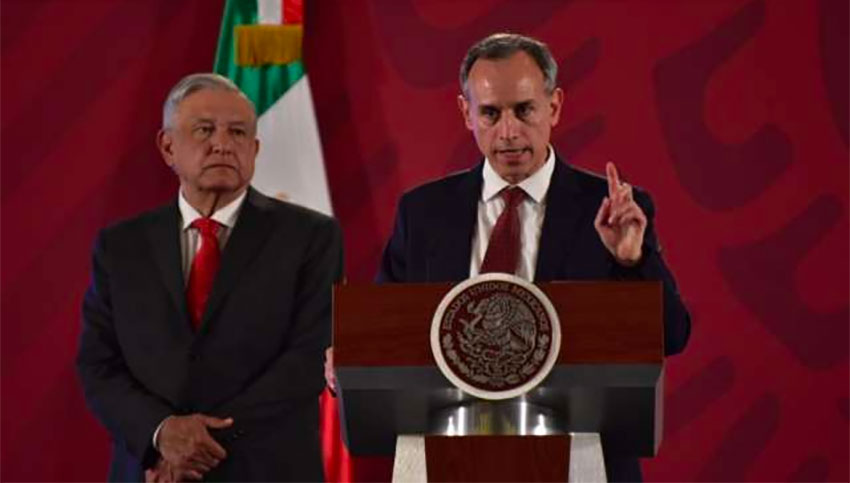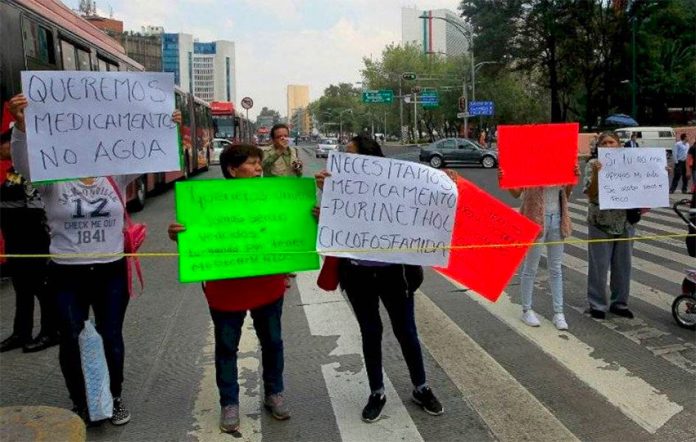A shortage of pediatric cancer medications continues to plague Mexico’s public health system, heightening the anxiety of parents whose children desperately need access to life-saving drugs.
Israel Rivas, father of a young cancer patient, told the newspaper El Financiero that the situation is going from “bad to worse” in the nation’s hospitals.
He said that the federal government has not provided children’s hospitals with a sufficient supply of cancer medications, as Deputy Interior Minister Ricardo Peralta promised would occur by Monday at the latest.
Rivas claimed that the government appears to be “rotating medicines from one state to another … without providing a certain solution to the problem.”
“Medications only last a few days and then there aren’t any. We’re worse off [than before] … because they [the government] suddenly take [drugs] from Puebla to give them to Michoacán, for example, or they supply certain regions and leave others short. That’s what’s happening. They’re failing to keep their word. I don’t know what we’re going to do,” he said.
“What I’ve found out is that … the situation is becoming more difficult in hospitals like the Siglo XXI [in Mexico City], the Ixtapaluca hospital [in México state] and the 20 de Noviembre [in Mexico City],” Rivas said.
He also said that no new children’s cancer drugs have reached Tijuana, supply is running out in Oaxaca and a very limited supply has been sent to Mérida. Rivas said that there is a nationwide or localized shortage of a range of drugs, including the chemotherapy agents vincristine, cyclophosphamide, ifosfamide and methotrexate.
Hermes Soto, a 5-year-old boy suffering from a rare and aggressive form of cancer that threatens his life, is one of scores if not hundreds of patients who have been affected by the drug shortage, which plagued hospitals for months last year after the government centralized drug purchases to reduce corruption and overpricing.
According to a report by the news agency Reuters, Soto’s chemotherapy treatment for the soft-tissue cancer in his arm was delayed by a week in January due to a lack of vincristine at his Mexico City hospital.
“He can relapse. The cancer can come back,” the boy’s mother, Esperanza Paz, told Reuters.
The crafts-maker said that the possibility of more shortages is of particular concern because “Hermes is now in the final stage of his treatment,” explaining, “we only need two cycles of chemotherapy to finish.”

Andrea Rocha, a lawyer representing the parents of more than 60 children who have been unable to access the medications they need in recent months, has filed lawsuits aimed at compelling the government to provide an adequate supply of medicine.
“We didn’t have a first-rate health system before but since the change of administration, the problem of shortages has grown immensely,” she told Reuters. “There has never been such a big crisis.”
President López Obrador has claimed in recent weeks that Mexico now has sufficient medicines, explaining that shortages were due to resistance by pharmaceutical distributors to the new procurement system as well as the hoarding of medicines by hospital officials and supply problems with drug companies in India and China.
However, his claim is inconsistent with the experience that many parents, such as Rivas, are having in children’s hospitals. Parents have protested on several occasions, including at the Mexico City airport.
Reuters reported that two young boys have died in recent months due to medicine shortages and that non-cancer patients, including children who underwent organ transplant operations, have also been affected.
Monica Márquez, a 41-year-old handicraft seller, told Reuters that she had to pay out of her own pocket or rely on donations in order to buy Tacrolimus and Mycophenolic acid – immunosuppressive drugs – after her 7-year-old daughter received a new kidney.
However, due to shortages, the price of Tacrolimus increased from 2,500 pesos (US $135) to 14,000 pesos (US $755) for a two-week dose, making it prohibitively expensive for many families.
Márquez said that she was afraid that her daughter, who waited four years for a kidney transplant, will relapse and “go back to the way she was before.”
The government, she claimed, is “underplaying” the drug shortage problem. “They are trying to cover the sun with a finger when clearly there is a very big problem.”
That claim is supported by the National Human Rights Commission (CNDH), which said that it received 552 complaints against health authorities for drug shortages between November 16, 2019 and February 11, 2020.
Of the complaints, 421 were against the Mexican Institute of Social Security, a major public healthcare provider, and 112 were against the State Workers’ Social Security Institute.
Both the Democratic Revolution Party and the National Action Party have filed complaints with the CNDH against the government due to the medicine shortage.
The López Obrador administration has also come under fire due to problems with the introduction of its new universal healthcare system, which replaced the Seguro Popular program on January 1.
One criticism has been that the National Institute of Health for Well-Being, or Insabi, scheme, is only providing primary and secondary healthcare for free, while low-income patients have to pay for specialist medical services in public hospitals.
The government has said that free access to specialist care will be provided by Insabi by December 1 and López Obrador said a year ago that Mexico will have a health care system comparable to those in Canada, the United Kingdom and Denmark in two years.
However, the problem with those pledges, said Esperanza Paz, the Mexico City mother whose son Hermes is still in the fight of his life, is that “cancer does not wait.”
Source: El Financiero (sp), Reuters (sp), El Universal (sp)
